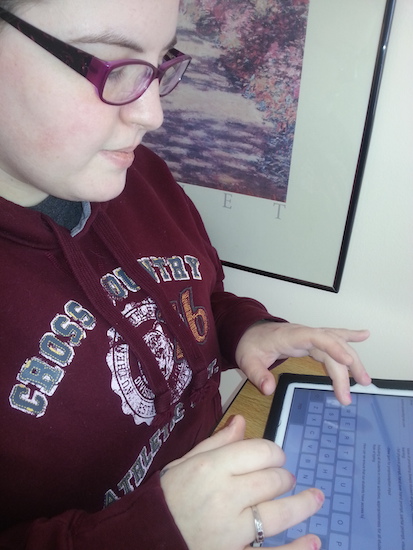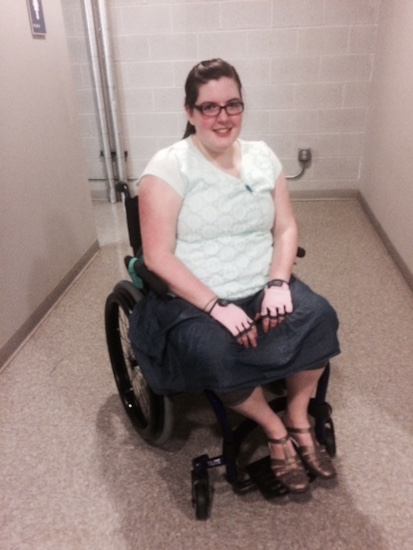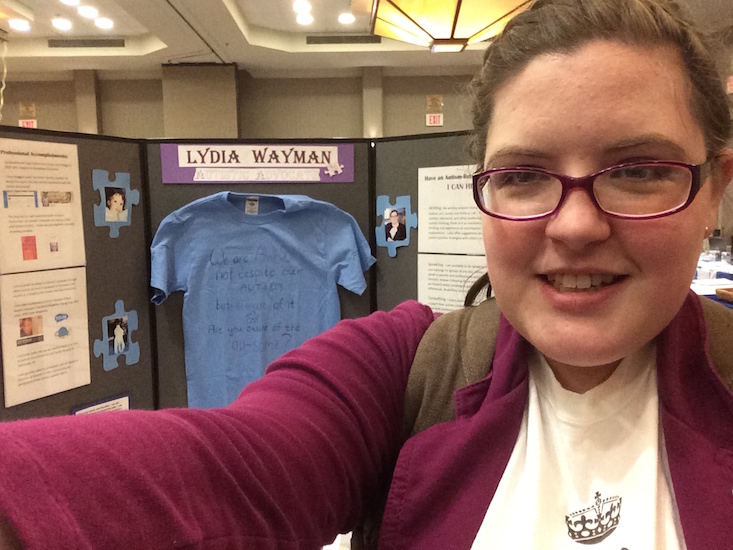Early on in my work as an autistic advocate, I heard one message wherever I went: You’re so inspiring!
Inside, I had mixed feelings. I really do appreciate the kindness, and I know that people often lack a deep understanding of disability, so they use the words they know as best they can. But part of me still cringed, not at the individual but at the fact that it’s such a widespread belief in our society. To a person with a disability, hearing that someone is inspired because they’re… existing… sends some pretty gut-wrenching messages. It makes me think that when you imagine being in my shoes, you probably wouldn’t find it worth getting out of bed in the morning to experience whatever it is that has brought us together. It’s saying, “You have it so bad that you’re a brave soul just for getting dressed and leaving the house.” It’s insinuating that I’m somehow remarkable for doing everyday things, like the man who told me I was so inspiring for talking to my best friend. It’s as if anything done by a disabled person becomes an immediate inspiration.
When I write or present at a conference, I’m just doing what I do. Your work might be in an office or a school. Mine is mostly behind my computer and sometimes at an event. I’m doing what I do best in a way that I hope will benefit others. I use the mind I’ve always had and the only body I’ve ever known… just like you do. How would you feel if someone said they’re inspired that you have the gumption to appear in public, being as short as you are, or that they’re inspired by your willpower to walk from here to there? You’re just doing what you do with what you’ve got.
When you post a meme of a person with Down syndrome accompanied by the text “the only disability is a bad attitude,” it works against what I strive to do every day. It can be hard to fathom, but disability doesn’t mean that anything is wrong with anybody. There are certainly cases of people who are very sick (I fall under that category, too), and that can cause suffering, but that isn’t the same thing. Disability means that a person has a mind or body that works differently than the majority of minds and bodies in society, so the world isn’t set up for that person to succeed.
Autism is a disability most often because a large majority of people are not autistic. But, if “the only disability is a bad attitude,” then am I to blame for struggling in public? Why should a boss provide accommodations for a blind employee? Just think more positively, Pete, and you’ll be able to do your work! Why should a school have IEP plans? A hip-hip-hooray or two is all that’s needed for any student to succeed! And, to paraphrase the awesome disability advocate Stella Young, when a wheelchair user approaches a staircase, a big smile is totally going to turn it into a ramp. Right?
… Wrong, of course. Disability is a cultural construct, but that doesn’t make it less real. Accommodations must absolutely-always-and-completely be available to those who need them.
There’s another meme with a person with prostheses running and the statement that “your excuse is invalid.” It reminds me of 10th grade gym class, when the day came that we had to run a timed mile. I’ve had type I diabetes since age 3, and that morning in gym class, my insulin pump malfunctioned, making my blood sugar almost 600, which is critically high. For most people, it’s go-to-the-ER kind of high, but it’s happened enough times that the ER couldn’t have done anything I wasn’t able to do for myself. It was just a matter of time for it to come down.
Then, my gym teacher told me that if I didn’t run my mile that day, I would get an automatic fail. I ran it during my lunch period. That meant no lunch. I hadn’t had breakfast because of the super-high blood sugar, which was still significantly high at noon. But I wasn’t going to forfeit my front-running place to be valedictorian in my 500-person class because of a lousy one-mile run. So… I ran it.
Halfway through, my legs gave out. The gym teacher didn’t even stop the clock and didn’t come over to check on me. Maybe she wasn’t watching. Maybe she was talking to someone. But that grade could make or break my high school career, so I didn’t have a second to spare, and, quite stupidly, I finished. the. freaking. test.
Though the horrible quip about my excuse being invalid wasn’t on my mind at the time, isn’t that exactly the kind of behavior it’s supporting? I had completely internalized that influence, that I should ignore the signs that maybe I should quit. Maybe it was time to take another direction. Maybe it’d be OK to say no to something that isn’t safe for me to do, no matter what other people thought.
It’s also saying that disability is never a reason to say that I can’t do something. It’s saying that accommodations are not necessary, that people should just try harder and do the thing. It blames the person with a mobility disability for being unable to walk. It faults the autistic person who cannot speak for not working hard enough.
Finally, it’s sending the able-bodied person the message that, dude, at last you’re not this screwed up. If this seriously broken person can do the thing, then certainly you can do the thing. It’s making you feel better about yourself and your circumstances by feeling pity for someone else — me. Instead of feeling inspired because I got my master’s while in a nursing home, which gave me a way to pass the time and do what I love every single day… how about being outraged at the lack of reasonable housing options and then speaking up about it? Much of the time, my disability is less of a problem for me than society’s ideas about it.
I still interface with the public as an autistic advocate, but I’ve learned some ways to encourage people to be inspired by things other than my disability status. I don’t want people to hear about my health battles or challenges due to autism and think to themselves, my goodness, if that girl who is that broken can succeed, and I’m not nearly that messed up, then surely I can do it.
What I do want is for people to meet me and think to themselves, holy mackerel, that girl is something! She’s enthusiastic, kind to others and passionate about changing things. To highlight that message, I weave other aspects of myself into my stories about disability, things like faith, family and mentoring. I broaden my message to show both how autism makes my experience very different… and I also share the ways that it really doesn’t make me different at all.
People still tell me they’re inspired. I love when they say, “You’re so passionate about what you do.” I am! “You’ve found God’s plan for your life.” I have! “It’s awesome that you’ve followed your dreams.” I agree.
But think about it for a second… those things aren’t related to disability. They aren’t based in the ways autism makes me different; they’re the ways it makes me just like everyone else. Everyone has those chances. If everyone follows their dreams, we might find inspiration a little harder to come by, but that’s just fine with me. A little less inspiration in this world… and we can trade it in for a lot more joy.
Follow this journey on Autistic Speaks.
The Mighty is asking the following: What’s one thing people might not know about your experience with disability and/or disease, and what would you say to teach them? If you’d like to participate, please send a blog post to community@themighty.com. Please include a photo for the piece, a photo of yourself and 1-2 sentence bio. Check out our Share Your Story page for more about our submission guidelines.



